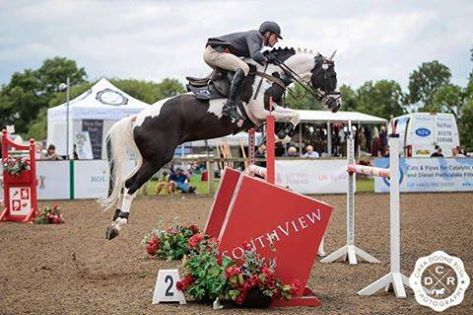Persian War
Persian War, by Persian Gulf out of the Chanteur II mare, Warning, started his racing life on the flat. He was trained by Dick Hern and carried the colours of his breeder Jakie Astor in his first two seasons, when he won two small staying races in the autumn of his three year old days.He was bought as a potential hurdler by David Leyland-Naylor after that and sent to Tom Masson at Lewes, where he soon showed he was a cut above the average juvenile.
Masson thought a great deal of the big dark bay horse and actually backed him to win the 1967 Champion Hurdle as a four year old, a feat not achieved since Forestation did it in 1942.
Persian War was badly baulked by the eventual winner Capablanca in his first venture over timber and did well to recover and finish second. He then chalked up three on the trot, almost literally, and it was the last of these wins that sealed his fate. It was the televised Kintbury Hurdle at Newbury, which Persian War, ridden by Bunny Hicks, won by eight lengths. He was spotted by Henry Alper, a businessman who was considering buying a racehorse. He set his heart on the brilliant youngster he had seen on the screen. Alper had to go to more than �9000 to get the horse from Masson and his owner. It was a record for a hurdler at the time and turned out to be a bargain.
Alper sent his new aquisition to Brian Swift, who had just set up his own yard at Epsom. He got part of the purchase price back a week later when Persian War, ridden by jimmy Uttley, won the Chalow Hurdle at Newbury. The four year old, on Swift`s advice, missed the festival and went for his own age group`s championship, the Triumph Hurdle,, then run at the April meeting. His last run before Cheltenham was the Friary Meux Gold Cup Hurdle at Kempton, and here Persian War encountered the first of many mishaps that were to pepper his career. He hit the sixth hurdle hard and could only finish third to Acrania and Te Fou. On his return to the saddling enclosure he had blood pouring from his mouth and it was discovered that he had bitten through his tongue and knocked two teeth out.
He soon recovered and five weeks later at Cheltenham went ahead approaching the last and came up the hill strongly enough to hold off the fast finishing Te Fou. He deserved a rest and that summer he got one. His only objective was the Champion and when he won the the Wyld Court Hurdle at Newbury by 25 lengths, it seemed only a matter of getting him to the post to collect.
But Persian War attracted more than his share of accident and illness. A week after Newbury it was decided to send him to Cheltenham to pick up the Lansdown Hurdle prize money, a formality on paper. It was an evil day with rain lashing and wind howling. The day`s misery was completed when Persian War slipped going into the second last, hit the top bar with his head and knocked himself out. He lay there in the mud for several minutes and those in the stands feared the worst. But happily no lasting damage was sustained.
There was another cloud on the horizon, A foot-and-mouth outbreak in Britain stopped racing and Alper decided it would be a good idea for his horse to be shipped over to France. Swift, with the horse`s welfare and future at heart did not agree. Persian War was moved and sent to a little known trainer at Chantilly. He there contracted a severe internal chill and was in a sorry state when sent back to England, or rather Wales, by the picked by by Alper as his new trainer, Colin Davies.
It was with Davies, a shrewd and articulate trainer and businessman, that the horse truly showed his quality. He recovered from his illness quickly, he was an exceptionally tough horse, physically and mentally. He ran two fine seconds under big weights within a week at the end of January 1968.
Persian War leads Major Rose and Sempervivum over the final flight in the 1968 Schweppes Gold Trophy Hurdle.
He was entered in the Schweppes as part of the build up to Cheltenham and Davies would have happy with finishing in the first three. He carried 11st 13lb and gave what was arguably the best performance of his career that day. There were 33 runners, the most that there had been in the races 16 runnings. They included top-class handicappers like Sempervivum, Stubbs II, Kirriemuir, Hill House, Louis Boy and Black Justice.
The betting concerned only Persian War and Major Rose, a six year old trained by Ryan Price who had won four out of five Schweppes so far. He would have won his fifth without Persian War around. Major Rose ran a fine race and tackled Persian War at the last. The pair duelled to the line but it was the younger horse who was the stronger, sticking his head out to score by half a length. He was giving Major Rose 5lbs and set a weight carrying record.
Incredibly, he did not start favourite for the Champion, that privilege went to Tom Jones`s lightly raced Chorus II, winner of the Ackerman Skeaping at Sandown, but the issue was never in doubt from the moment Persian War took the lead two from home. He won by a long looking four lengths.
The going that day was firm. When he won his second title the following year it was heavy and in the hat-trick year, 1970, it was good to yielding, proof that he could operate in the highest class in any conditions.
But each time it had been a hard road, and on occasions, harder than necessary. His owner insisted in racing him in France in the summer, which would have been fine if the horse had a rest afterwards. But he also wanted to campaign Persian War on the Flat in the Autumn, which meant he never got the break he deserved.
At the start of the 1968-1969 season he got the break he didn`t deserve. Running in a minor event at Worcester he slipped and fell on the flat. When he got up he was badly lame and it transpired that he had fractured his femur and chipped a piece of bone off the end.
But true to form, he bounced back to take his second title at Cheltenham.
In his third Championship year his wind had begun to go. The courageous horse won only once that season, but it was the one that mattered.
After that season Alper took his horse away from Davies, who had served him well, after a disagreement over the sale of another horse in Davies`s yard. Persian War, then coming eight was sent to Arthur Pitt.
Persian War`s health jinx struck again when he had to have a tooth removed and lost gallons of blood during the operation. The skilful Pitt got him back on the road and won the 1970 Sweeps Hurdle at Fairyhouse with him. The horse carried top weight to victory. He made a gallant bid for a four timer at Cheltenham but had to give best, by four lengths, to the new young star, Bula. He did put his old rival Major Rose in his place once more, though.
The old horse`s last race that season was the Scottish Champion Hurdle, where he was unplaced and clearly on the downgrade. Any caring owner would surely retired him at that point. But Alper changed his home again, sending him to Dennis Rayson`s little yard at Exning, outside Newmarket. It was for Rayson, that we won his last and 18th race, the Latecomers Hurdle at Stratford in June 1972 a race worth �374. It was heartbreaking to see the old champion reduced to beating nonentities. His last race was back at Cheltenham when he finished second last in the Broadway Hurdle in January.
The crunch with Rayson came shortly afterwards. Alper hit on the bright idea of schooling the old horse over fences. Rayson refused and Persian War was sent to Jack Gibson near Cheltenham. Mercifully, perhaps, Persian War hurt a leg shortly afterwards, not seriously, but enough to keep him out of training for the rest of that season. He did come back enough to go back into work and was even being prepared for another tilt at the Festival, the County Hurdle being the nominated race, but bruised a leg on the eve of it and at last Alper announced the champions retirement.
Eventually, Alper was talked out of such plans and Persian War went to his final home, with former Royal jockey Harry Carr at the Genesis Green Stud at Wickham Brook, just outside Newmarket. He lived there for ten happy and at last, dignified years. Finally his old legs began to go and he found it difficult to get up and down. He was peacefully put down before the winter began.
In his seven year jumping career he had no fewer than six trainers. He was the ultimate champion and had he been in the ownership of a more knowledgeable racing man, could have achieved even greater heights.



